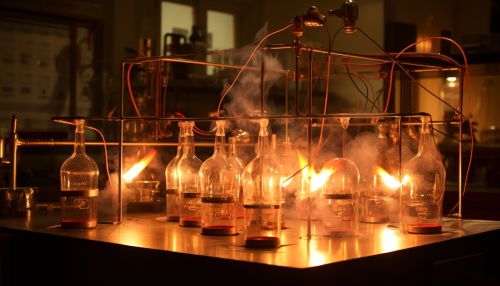Gibbs Free Energy
Introduction
Gibbs free energy (G) is a thermodynamic potential that measures the maximum reversible work that a system can perform at constant temperature and pressure. It is named after the American scientist Josiah Willard Gibbs who proposed it in 1873. The concept of Gibbs free energy plays a pivotal role in thermodynamics, physical chemistry, and biochemistry.
Definition
Gibbs free energy is defined as the enthalpy (H) of a system minus the product of the temperature (T) and the entropy (S) of the system. Mathematically, it can be expressed as:
G = H - TS
where: G = Gibbs free energy H = enthalpy T = temperature (in Kelvin) S = entropy


Derivation
The derivation of the Gibbs free energy equation is based on the first and second laws of thermodynamics. The first law, also known as the law of energy conservation, states that energy cannot be created or destroyed, only transformed. The second law, also known as the law of entropy, states that the entropy of an isolated system always increases over time.
Applications
Gibbs free energy has numerous applications in various fields of science and engineering. It is used to predict the spontaneity of a process, the equilibrium constant of a reaction, and the maximum work that can be done by a system at constant temperature and pressure.
Gibbs Free Energy and Spontaneity
One of the most significant applications of Gibbs free energy is in determining the spontaneity of a process. If the change in Gibbs free energy (ΔG) for a process is negative, the process is spontaneous. If ΔG is positive, the process is non-spontaneous. If ΔG is zero, the system is at equilibrium.
Gibbs Free Energy and Equilibrium
Gibbs free energy is also used to calculate the equilibrium constant (K) of a reaction. The relationship between ΔG and K is given by the equation:
ΔG = -RT ln K
where: R = universal gas constant T = temperature (in Kelvin) K = equilibrium constant
Gibbs Free Energy and Maximum Work
The concept of Gibbs free energy is also used to determine the maximum work that can be done by a system at constant temperature and pressure. This is particularly useful in the field of chemical engineering, where it is used to optimize the efficiency of chemical processes.
Conclusion
Gibbs free energy is a fundamental concept in thermodynamics that has wide-ranging applications in various fields of science and engineering. It provides a measure of the maximum reversible work that a system can perform at constant temperature and pressure, and is used to predict the spontaneity of a process and the equilibrium constant of a reaction.
